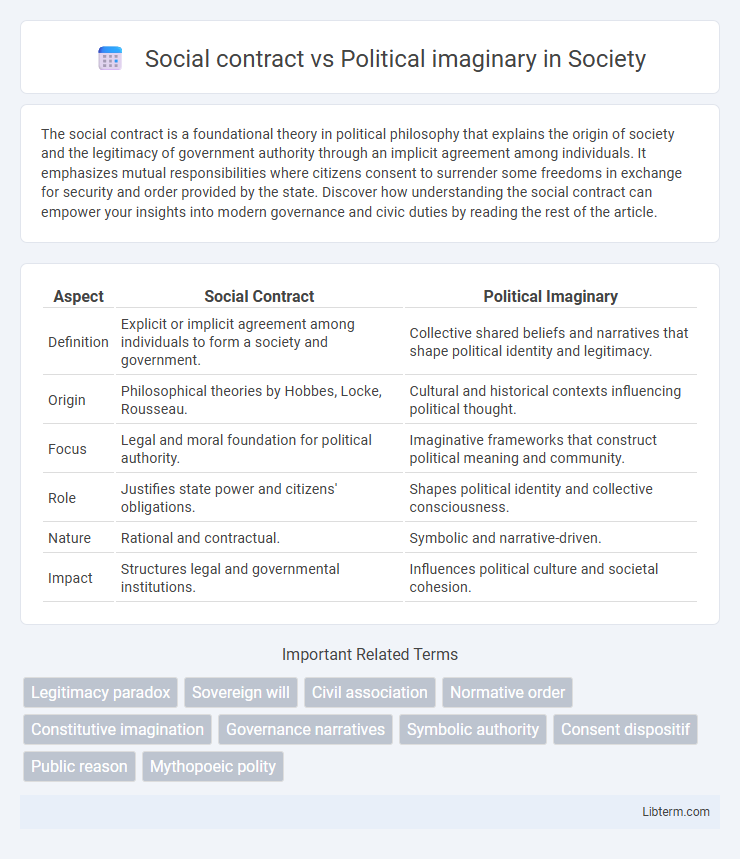The social contract is a foundational theory in political philosophy that explains the origin of society and the legitimacy of government authority through an implicit agreement among individuals. It emphasizes mutual responsibilities where citizens consent to surrender some freedoms in exchange for security and order provided by the state. Discover how understanding the social contract can empower your insights into modern governance and civic duties by reading the rest of the article.
Table of Comparison
| Aspect | Social Contract | Political Imaginary |
|---|---|---|
| Definition | Explicit or implicit agreement among individuals to form a society and government. | Collective shared beliefs and narratives that shape political identity and legitimacy. |
| Origin | Philosophical theories by Hobbes, Locke, Rousseau. | Cultural and historical contexts influencing political thought. |
| Focus | Legal and moral foundation for political authority. | Imaginative frameworks that construct political meaning and community. |
| Role | Justifies state power and citizens' obligations. | Shapes political identity and collective consciousness. |
| Nature | Rational and contractual. | Symbolic and narrative-driven. |
| Impact | Structures legal and governmental institutions. | Influences political culture and societal cohesion. |
Understanding the Social Contract: Foundations and Evolution
The social contract is a foundational political theory that explains the legitimacy of state authority through the implicit agreement among individuals to form a society and accept certain rules for mutual benefit. Its evolution spans from classical theorists like Thomas Hobbes, John Locke, and Jean-Jacques Rousseau, who emphasized consent and individual rights, to contemporary interpretations addressing modern governance and social justice. Understanding the social contract requires examining its emphasis on the balance between individual freedom and collective order, contrasting with political imaginaries that shape collective identities and cultural narratives beyond formal agreements.
Defining Political Imaginary: Collective Visions of Society
Political imaginary refers to the collective visions, symbols, and narratives that shape how societies perceive their political structures and possibilities. It encompasses shared meanings and ideals that influence citizens' understanding of governance, identity, and social order, often transcending formal agreements like social contracts. These imaginaries provide a framework for imagining alternative political futures and legitimizing existing power relations within complex social contexts.
Historical Roots: From Hobbes to Rousseau
The social contract theory, rooted in Hobbes' Leviathan, posits that individuals consent to surrender certain freedoms to a sovereign authority in exchange for security and order. Rousseau's Political Imaginary extends this concept by emphasizing collective will and the formation of a general will that transcends individual interests, envisioning society as a moral and political community. Historical debates between Hobbes' focus on centralized power and Rousseau's ideal of participatory democracy highlight evolving perspectives on state legitimacy and social cohesion.
The Role of Social Contract in Modern Governance
The social contract serves as a foundational principle in modern governance, establishing the legitimacy of state authority through the consent of the governed and the mutual obligations between citizens and rulers. This theoretical framework informs constitutional design, civil rights protections, and the enforcement of laws that balance individual freedoms with collective security. Unlike the political imaginary, which encompasses shared myths and cultural narratives shaping political identity, the social contract provides a concrete basis for institutional accountability and policy-making in democratic societies.
Political Imaginaries and the Shaping of Public Perception
Political imaginaries shape public perception by providing collective visions that legitimize governance systems and influence political behavior. These shared narratives construct identities and social norms, enabling citizens to interpret political realities and participate in civic life. Unlike the social contract, which formalizes obligations between rulers and ruled, political imaginaries embed political authority in cultural and symbolic frameworks.
Key Differences: Social Contract Versus Political Imaginary
The social contract is a theoretical framework that explains the origin of society and government through an implicit agreement among individuals to create and abide by collective rules for mutual benefit. In contrast, the political imaginary encompasses the broader set of symbols, myths, and collective beliefs that shape people's perceptions of political authority and community beyond formal agreements. Key differences lie in the social contract's emphasis on rational consent and legal foundations, while the political imaginary focuses on shared cultural meanings and emotional attachments that sustain political order.
Intersections: Where Social Contract Meets Political Imaginary
The social contract, as a foundational theory in political philosophy, intersects with the political imaginary by shaping collective perceptions of legitimacy and governance. Both concepts engage with the creation of shared norms and the imagined structures that justify authority and civic responsibilities. This intersection highlights how societal agreements reflect and reinforce the broader symbolic narratives that sustain political order and identity.
Social Change Driven by Political Imaginaries
Political imaginaries shape collective visions of society, driving social change by redefining norms and institutions beyond the formal agreements of social contracts. Unlike social contracts, which emphasize mutual obligations and rights codified in laws, political imaginaries inspire transformative possibilities through shared symbols, narratives, and collective aspirations. This dynamic interplay enables societies to envision and enact progressive reforms that challenge established power structures and foster inclusive social development.
Critiques and Limitations of the Social Contract Theory
Social contract theory faces critiques for its assumptions about universal agreement and rational individuals, often overlooking historical and structural inequalities affecting marginalized groups. Political imaginaries challenge the theory by emphasizing collective narratives and cultural meanings that shape governance beyond formal agreements. Limitations of social contract theory include its abstraction from real-world complexities and potential to justify exclusionary practices under the guise of consensual order.
Contemporary Relevance: Rethinking Society and Power Structures
Social contract theory remains central in contemporary debates on governance legitimacy, emphasizing individuals' consent as the foundation of political authority. Political imaginary shapes collective visions of society, influencing how communities envision justice, rights, and power distribution in a constantly evolving political landscape. Rethinking these concepts helps address modern challenges such as inequality, state accountability, and participatory democracy by reconceptualizing social bonds and power relations.
Social contract Infographic

 libterm.com
libterm.com